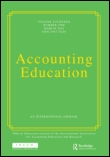
Accounting Education
Scope & Guideline
Dedicated to the Evolution of Accounting Teaching
Introduction
Aims and Scopes
- Innovative Pedagogical Approaches:
Research on new teaching methodologies, such as experiential learning, flipped classrooms, and gamification, aimed at engaging students and improving their learning experiences in accounting. - Integration of Technology in Education:
Exploration of how digital tools, online learning platforms, and technological advancements like blockchain and artificial intelligence can be effectively integrated into accounting education. - Curriculum Development and Assessment:
Studies focusing on the design and assessment of accounting curricula to ensure they meet current industry standards and address the evolving needs of the accounting profession. - Student Behavior and Performance:
Research examining factors influencing student motivation, self-efficacy, and academic performance, as well as their preferences for teaching and assessment methods. - Soft Skills and Employability:
Investigations into the incorporation of soft skills, such as teamwork, communication, and critical thinking, into the accounting curriculum to enhance students' employability. - Sustainability in Accounting:
Research addressing the integration of sustainability principles into accounting education, preparing students to navigate the increasing importance of environmental and social governance.
Trending and Emerging
- Impact of COVID-19 on Accounting Education:
Research focused on the adaptations and innovations in teaching methods and student engagement strategies that emerged during and after the COVID-19 pandemic. - Sustainability and Ethics in Accounting:
A growing emphasis on incorporating sustainability and ethical considerations into accounting curricula, reflecting the increasing importance of corporate social responsibility. - Digital Transformation and Online Learning:
An emerging focus on the role of digital technologies in enhancing accounting education, including online learning models, digital assessments, and the use of educational technology. - Developing Graduate Employability Skills:
Increased research on the integration of employability skills into accounting education, with a focus on aligning academic programs with industry expectations and job market demands. - Diversity and Inclusion in Accounting Education:
A rising trend towards understanding and addressing diversity and inclusion within accounting programs, including research on barriers and strategies for fostering diverse learning environments. - Collaborative Learning and Peer Engagement:
A trend towards promoting collaborative learning experiences, including group work and peer feedback mechanisms, to enhance student engagement and learning outcomes.
Declining or Waning
- Historical Perspectives in Accounting Education:
Research exploring the historical context and evolution of accounting education has seen a decline, possibly overshadowed by more contemporary issues related to technology and pedagogy. - Basic Technical Skills Training:
There appears to be a waning focus on traditional technical skills training, such as manual bookkeeping, as educational priorities shift towards digital competencies and analytical skills. - Conventional Assessment Methods:
The exploration of traditional assessment methods, such as standardized testing, is declining in favor of innovative assessment strategies that emphasize critical thinking and real-world application. - The Role of Faculty in Traditional Teaching Models:
Research centered on faculty roles in conventional lecture-based teaching is decreasing as the focus shifts towards collaborative and active learning environments. - Disciplinary Boundaries in Accounting Education:
There is a reduction in studies that strictly adhere to traditional accounting disciplines, as interdisciplinary approaches become more favored in addressing complex business challenges.
Similar Journals

Medical Science Educator
Fostering dialogue at the intersection of medicine and education.Medical Science Educator, published by SpringerNature, is an esteemed journal committed to advancing the intersection of educational methodologies and medical science. With a significant impact in its field, this journal holds a Q2 ranking in both Education and Medicine (miscellaneous) categories as of 2023, reflecting its dedication to high-quality research and scholarly dialogue. Operating in a digital format, the journal uniquely facilitates access to pivotal studies from its inception in 2011 until 2024, fostering innovation in medical education. The latest rankings highlight its credibility, placing it at the 63rd percentile in Social Sciences - Education and the 56th percentile in Medicine - Medicine (miscellaneous) within Scopus. This platform serves as an invaluable resource for educators, researchers, and practitioners aiming to enhance teaching practices and shape the future of medical education.
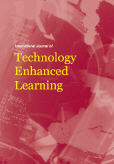
International Journal of Technology Enhanced Learning
Catalyzing Educational Excellence through Technology IntegrationInternational Journal of Technology Enhanced Learning, published by INDERSCIENCE ENTERPRISES LTD, is a premier scholarly journal that comprehensively explores the intersection of technology and education, fostering innovative approaches to enhance learning processes. Established in 2008 and continuing through 2024, the journal is pivotal for researchers, educators, and technology professionals aiming to disseminate and engage with cutting-edge developments in technology-enhanced learning environments. With an admirable ranking in Scopus—placing in the 72nd percentile of Education and 49th in Computer Science Applications—the journal reflects a robust influence in the fields of Computer Science Applications and Education, as evidenced by its Q2 and Q3 quartile rankings. The journal not only provides a platform for empirical research and theoretical discourse but also emphasizes practical implementations in e-learning. Although it does not offer open access, its curated collection of articles serves as a vital resource for scholars and practitioners who are dedicated to advancing the nexus of technology and education.

Frontiers in Education
Empowering Educators Through Research Excellence.Frontiers in Education is a distinguished open-access journal published by FRONTIERS MEDIA SA, dedicated to the advancement of educational research and practice. Launched in 2016, this journal has quickly established itself within the field, attaining a Q2 ranking in Education for 2023, positioning it among the top-tier publications in the field. With a Scopus rank of #580 out of 1543, it lies in the 62nd percentile, highlighting its significance and reach within the scholarly community. Based in Lausanne, Switzerland, Frontiers in Education aims to provide a collaborative platform for educators, researchers, and practitioners to disseminate high-quality research findings and innovative educational practices. As an open-access publication, it not only champions the principles of accessibility but also enhances the visibility and impact of its published work. This journal is instrumental in shaping the future of education through rigorous research, critical analysis, and the promotion of best practices, making it an essential resource for anyone invested in the field.
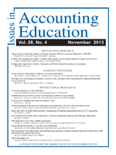
ISSUES IN ACCOUNTING EDUCATION
Shaping the Future of Accounting through ScholarshipISSUES IN ACCOUNTING EDUCATION is a leading academic journal published by the American Accounting Association, dedicated to advancing the field of accounting education through innovative research and practical applications. With an ISSN of 0739-3172 and an E-ISSN of 1558-7983, this journal has established itself as a key resource for accounting educators, researchers, and practitioners alike. Ranked in the Q2 category for Education and Q3 for Accounting in 2023, it plays a critical role in disseminating knowledge that enhances pedagogical practices and curriculum development across the globe. The journal is recognized for its robust contributions to the Social Sciences and Business Management fields, with Scopus rankings placing it in the 58th and 42nd percentiles, respectively. Although it does not offer open access, the journal is committed to fostering scholarly dialogue and contributing to the continuous development of accounting education from 2009 to 2024. Researchers, educators, and students will find invaluable insights and findings that not only shape academic discourse but also inform best practices in the classroom.
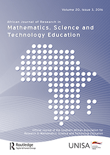
African Journal of Research in Mathematics Science and Technology Education
Exploring New Frontiers in Mathematics and Technology PedagogyAfrican Journal of Research in Mathematics Science and Technology Education is a distinguished academic journal, published by Routledge Journals, Taylor & Francis Ltd, dedicated to advancing knowledge in the fields of mathematics, science, and technology education within the African context. With an ISSN of 1811-7295 and an E-ISSN of 2469-7656, this journal has been a crucial platform for scholarly discourse since its inception in 1997, steadily gaining reputation and impact among researchers, educators, and policymakers. The journal features a rigorous peer-review process, ensuring that high-quality research garners visibility across various disciplines, as evidenced by its Quartile rankings in Computer Science Applications, Education, Engineering, Mathematics, and Physics and Astronomy. With its commitment to serving the educational community and fostering innovative practices, the African Journal of Research in Mathematics Science and Technology Education plays a pivotal role in shaping the future of STEM education in Africa and beyond.
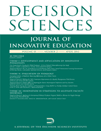
Decision Sciences-Journal of Innovative Education
Exploring the dynamics of decision sciences in modern education.Decision Sciences - Journal of Innovative Education is a prestigious academic journal published by WILEY, focusing on the intersecting fields of decision sciences, education, and management. With an ISSN of 1540-4595 and an E-ISSN of 1540-4609, this journal offers valuable insights and research findings aimed at fostering innovative educational practices and decision-making processes. As of 2023, it boasts an impressive Q2 ranking in several categories, including Business, Management and Accounting, Decision Sciences, and Education. This positions it within the top tier of journals in its field, reflecting its commitment to high-quality scholarship. Researchers and educators benefit from its extensive coverage of contemporary topics and methodologies, making it a vital resource for those seeking to enhance their understanding and application of innovative strategies in education. Although it does not currently offer open access, the journal remains accessible via institutional subscriptions, ensuring that its impactful research is readily available to a broad audience. The journal's scope spans from 2011 to 2024, allowing for a comprehensive exploration of evolving trends in decision sciences and education.

Didactica de las Ciencias Experimentales y Sociales
Championing high-quality research for impactful education.Didactica de las Ciencias Experimentales y Sociales is a prestigious academic journal dedicated to advancing the field of science and social studies education. Published by the University of Valencia’s Department of Didactics in Experimental and Social Sciences, this journal has provided a vital platform for researchers and educators since its establishment. With an open access model in place since 1989, it ensures that valuable research findings are freely accessible, fostering wider educational impact and collaboration across institutions. Although lacking a specified H-Index or Scopus ranking at present, the journal consistently aims to disseminate high-quality research articles, review papers, and innovative educational practices that contribute to the improvement of science and social sciences teaching. As an essential resource for educators, researchers, and students alike, the journal invites contributions that explore diverse pedagogical strategies and empirical studies, reinforcing its commitment to enriching teaching methodologies in contemporary educational landscapes.

Eurasian Journal of Educational Research
Exploring diverse educational landscapes and practices.The Eurasian Journal of Educational Research, published by ANI YAYINCILIK, is a distinguished platform dedicated to advancing the field of education since its inception in 2008. Operating under a robust commitment to open access principles, this journal facilitates the dissemination of high-quality research and innovative practices across diverse educational domains. With an ISSN of 1302-597X and an E-ISSN of 2528-8911, it serves as a significant resource for educators, researchers, and policymakers within the academic community. Holding a Q3 rating in Education for the year 2023, and ranked 792 out of 1543 within the Scopus database, the journal exemplifies its commitment to enhancing educational outcomes across Eurasia. The Eurasian Journal of Educational Research aims to publish original research, systematic reviews, and insightful perspectives that contribute to the ongoing discourse in educational research, policy, and practice. Based in Ankara, Turkey, it also emphasizes the importance of regional studies and their implications on global educational trends, thus enriching the academic landscape with localized knowledge while fostering international collaborative networks.

Journal of University Teaching and Learning Practice
Exploring New Frontiers in University EducationWelcome to the Journal of University Teaching and Learning Practice, a premier publication dedicated to advancing research and practice in higher education. Published by UNIV WOLLONGONG, this journal provides a vital platform for educators, researchers, and practitioners to explore innovative teaching methodologies and learning strategies to enhance the university experience. With an impressive impact factor and categorized in the Q2 quartile for Education in 2023, this journal ranks in the top percentile of educational research, boasting a Scopus rank of 437 out of 1543 in Social Sciences Education. Since its inception in 2016, the journal has become a significant contributor to the field, fostering a scholarly dialogue among scholars from around the globe. Although currently not operating under an Open Access model, it offers valuable insights and is committed to publishing high-quality research that reflects best practices in educational settings. Join our community of academics dedicated to transforming university teaching and learning through rigorous scholarship and innovative practices.

International Journal of Mathematical Education in Science and Technology
Elevating Learning: Where Mathematics Meets InnovationThe International Journal of Mathematical Education in Science and Technology, published by TAYLOR & FRANCIS LTD, is a leading academic journal dedicated to the interdisciplinary field of mathematical education, emphasizing the integration of science and technology. With an ISSN of 0020-739X and E-ISSN 1464-5211, the journal serves as a vital resource for researchers, educators, and practitioners seeking innovative methodologies and pedagogical frameworks in mathematics education. As of 2023, it has achieved a prestigious standing in Q2 quartiles across three categories: Applied Mathematics, Education, and Mathematics (miscellaneous), with notable rankings in Scopus, including 16th in Mathematics and 486th in Social Sciences Education. The journal, which has been converging its research and findings since 1970 and will continue to do so until 2024, is not available as an open access publication, but offers a wealth of insights for those committed to enhancing mathematical understanding in various educational contexts. Its emphasis on cutting-edge research makes it a crucial conduit for advancements in both theoretical and practical aspects of mathematics education.